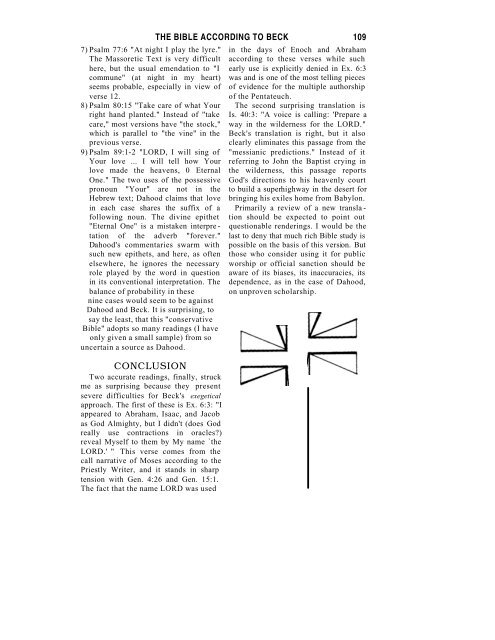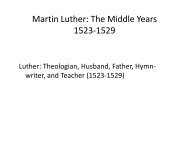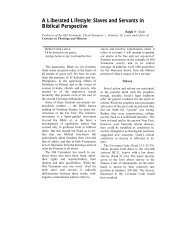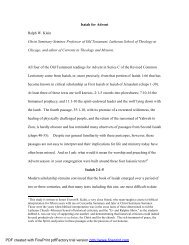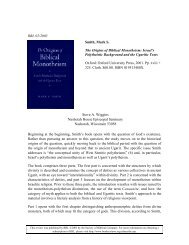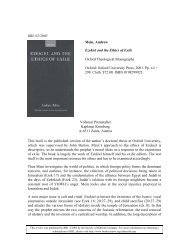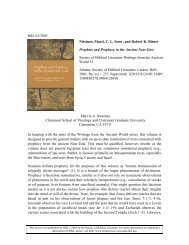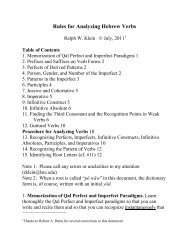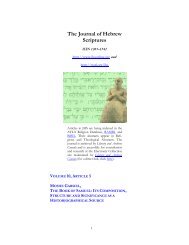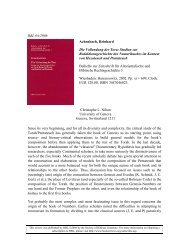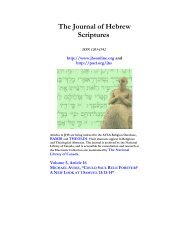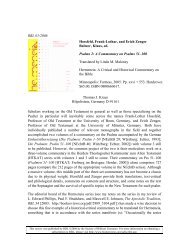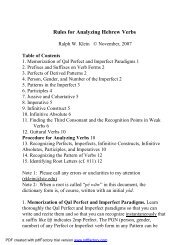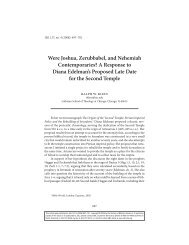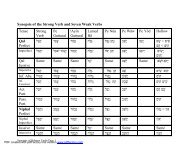The Bible According to Beck
The Bible According to Beck
The Bible According to Beck
You also want an ePaper? Increase the reach of your titles
YUMPU automatically turns print PDFs into web optimized ePapers that Google loves.
7) Psalm 77:6 "At night I play the lyre."<br />
<strong>The</strong> Massoretic Text is very difficult<br />
here, but the usual emendation <strong>to</strong> "I<br />
commune" (at night in my heart)<br />
seems probable, especially in view of<br />
verse 12.<br />
8) Psalm 80:15 "Take care of what Your<br />
right hand planted." Instead of "take<br />
care," most versions have "the s<strong>to</strong>ck,"<br />
which is parallel <strong>to</strong> "the vine" in the<br />
previous verse.<br />
9) Psalm 89:1-2 "LORD, I will sing of<br />
Your love ... I will tell how Your<br />
love made the heavens, 0 Eternal<br />
One." <strong>The</strong> two uses of the possessive<br />
pronoun "Your" are not in the<br />
Hebrew text; Dahood claims that love<br />
in each case shares the suffix of a<br />
following noun. <strong>The</strong> divine epithet<br />
"Eternal One" is a mistaken interpre -<br />
tation of the adverb "forever."<br />
Dahood's commentaries swarm with<br />
such new epithets, and here, as often<br />
elsewhere, he ignores the necessary<br />
role played by the word in question<br />
in its conventional interpretation. <strong>The</strong><br />
balance of probability in these<br />
nine cases would seem <strong>to</strong> be against<br />
Dahood and <strong>Beck</strong>. It is surprising, <strong>to</strong><br />
say the least, that this "conservative<br />
<strong>Bible</strong>" adopts so many readings (I have<br />
only given a small sample) from so<br />
uncertain a source as Dahood.<br />
CONCLUSION<br />
Two accurate readings, finally, struck<br />
me as surprising because they present<br />
severe difficulties for <strong>Beck</strong>'s exegetical<br />
approach. <strong>The</strong> first of these is Ex. 6:3: "I<br />
appeared <strong>to</strong> Abraham, Isaac, and Jacob<br />
as God Almighty, but I didn't (does God<br />
really use contractions in oracles?)<br />
reveal Myself <strong>to</strong> them by My name `the<br />
LORD.' " This verse comes from the<br />
call narrative of Moses according <strong>to</strong> the<br />
Priestly Writer, and it stands in sharp<br />
tension with Gen. 4:26 and Gen. 15:1.<br />
<strong>The</strong> fact that the name LORD was used<br />
THE BIBLE ACCORDING TO BECK 109<br />
in the days of Enoch and Abraham<br />
according <strong>to</strong> these verses while such<br />
early use is explicitly denied in Ex. 6:3<br />
was and is one of the most telling pieces<br />
of evidence for the multiple authorship<br />
of the Pentateuch.<br />
<strong>The</strong> second surprising translation is<br />
Is. 40:3: "A voice is calling: 'Prepare a<br />
way in the wilderness for the LORD."<br />
<strong>Beck</strong>'s translation is right, but it also<br />
clearly eliminates this passage from the<br />
"messianic predictions." Instead of it<br />
referring <strong>to</strong> John the Baptist crying in<br />
the wilderness, this passage reports<br />
God's directions <strong>to</strong> his heavenly court<br />
<strong>to</strong> build a superhighway in the desert for<br />
bringing his exiles home from Babylon.<br />
Primarily a review of a new transla -<br />
tion should be expected <strong>to</strong> point out<br />
questionable renderings. I would be the<br />
last <strong>to</strong> deny that much rich <strong>Bible</strong> study is<br />
possible on the basis of this version. But<br />
those who consider using it for public<br />
worship or official sanction should be<br />
aware of its biases, its inaccuracies, its<br />
dependence, as in the case of Dahood,<br />
on unproven scholarship.


